- Home
- Stephen L Carter
The Impeachment of Abraham Lincoln Page 8
The Impeachment of Abraham Lincoln Read online
Page 8
About to argue, Jonathan decided to let the matter drop. Dennard’s views were plain, but if Abigail wanted to postpone accepting that truth until the lawyer returned from the West Coast, he saw no reason to disabuse her.
He said, “Our response is due on Tuesday.” When Abigail did not reply, he continued. “Mr. McShane was supposed to go to the Senate today with Mr. Speed to request more time to answer the charges.” Still she would not rise. “I imagine that Mr. Speed can do that alone. He is the attorney general of the United States, after all.”
“Yes,” she said, vaguely.
“Why did you ask that question? You asked Inspector Varak whether they were … killed … going into the brothel or coming out. Why does that matter?”
Abigail was a while answering. They stopped at Seventh Street while a train passed, bringing passengers and produce from the South to the depot of the Baltimore and Potomac line. Acrid gray smoke made their eyes water. Faces glared from the windows. None looked happy to be arriving in Washington City.
“I was testing a theory,” she said.
“And what theory is that?”
“That the inspector is not really investigating the case.” She closed her eyes. “His inability to answer my simple question suggests that I am correct.”
Jonathan was appalled. “Why wouldn’t he be investigating the case?”
But Abigail only shook her head, and then, suddenly, straightened. “I have changed my mind. I shall get out here.”
“I beg your pardon.”
“I will catch the horsecars. I am going home.”
“I can take you—”
“I need to be alone.” She touched his hand, briefly, with gloved fingers. “We both do.”
III
Jonathan returned to the offices on Fourteenth Street and barricaded himself inside with Mr. Plum, whom he scooped up from Grafton’s office on his own authority. He had Little guard the door, because the police officers below—in light of events, there were now two—were letting too many reporters slip past. To Plum, he dictated a telegram to Rufus Dennard, McShane’s partner. Dennard had been away in the West this past month, trolling for railroad business, because nowadays no firm could grow without any. Jonathan’s telegram urged Dennard’s immediate return. Plum wrung slender hands. The wires were down, he said. Jonathan asked how he knew. They were always down, Plum explained, desperately. He had previously worked as a clerk in the War Department, said Plum, and knew sabotage when he saw it. The rebels, no question. They’d been hiding out for the past year and a half in the Shenandoah Valley, and now they were emerging, getting ready to isolate the capital again, the way they did back in ’61, and the best thing for all concerned might be to pack our bags and head for—
Jonathan shushed the poor man, reassured him, and sent him on his way to the telegraph office.
Alone again, Jonathan paged through each of the city’s half dozen or so daily newspapers, but learned nothing he had not learned the first time. Sliced up. The newspapers loved that detail. Full of energy, he roamed the suite. He realized that he should have sent Plum with a note to the White House, too. To Speed. Or perhaps to Stanton. It occurred to him that he did not know precisely who was in charge. The others surely knew that Mr. Lincoln’s response was due on Tuesday, but they had been expecting McShane to take the lead. As far as Jonathan knew, there were no files or memoranda for tomorrow. At least, he had not been told to write any. He was not sure precisely what his responsibilities were.
Jonathan stood at the window, looking down at the crowd looking up. He felt alone, and cold, and unhappy, the office alive with neither McShane’s air of acerbic dismissal nor Abigail’s constant argumentative chatter.
He tried to work out why McShane would have been carrying an envelope addressed to the hated Senator Wade. Perhaps he wanted to meet to discuss the procedures for the trial—but then why make the letter confidential? Why risk carrying it to a brothel? So perhaps matters were the other way around, and McShane had been conveying a secret offer from his client. The Democratic papers had been hinting for a year that Mr. Lincoln planned to resign his office and retire to Illinois. Perhaps he was bargaining to do just that.
But the brothel. The brothel was the strangest part of all. If ever a man adored his wife, it was Arthur McShane. Jonathan was no fool. He could hardly have attended school in New Haven without gaining a proper appreciation for the fleshy side of life and for the variety of places where a variety of men sought their pleasures outside of marriage. Yet he could not imagine—
“Mister Jonathan?”
He started, and turned. Little stood in the doorway.
“Sir, you has a visitor.”
Almost before the words were out of the black man’s mouth, a woman’s form brushed past him.
Jonathan gaped in surprise, but swiftly found a smile.
Margaret Felix. His Meg. His fiancée.
IV
Meg was broad and tough and deliberate. Every movement of her soft body exuded a winning confidence: you knew at first glance that she would accomplish whatever she set her mind to. Margaret Felix took after her father, the famous General Hiram Felix, the Lion of Louisiana, who had taken over the war in the West after Lincoln reassigned Grant to Virginia. Her alabaster skin glowed with energy. Her eyes were a cool, determined green. She offered a quick hug and a formal, delicate kiss, and he noticed her mammy in the hallway.
“I wish to extend my condolences,” Meg announced in her clear, military voice. “Otherwise, I would not disturb your work.”
Her father’s schedule had changed, so the two of them had taken the cars last night, Meg continued: for she had a way of answering questions not yet asked. They were staying at Aunt Clara’s, on Eighth Street, as she had told him they would. She had wanted to surprise him. But now, she said, wanted instead to reassure him.
“Father and I must return to Philadelphia on Sunday. Will you dine with us tomorrow? Pleasant company will surely help you to put all of this unpleasantness out of your mind.”
And as Margaret Felix murmured and answered and questioned, it became clear to Jonathan that her principal intention was making sure that the events of last night, as she kept calling them, would not lead somehow to the postponing of the wedding, now set for October.
As for Jonathan, he did what he could to reassure her in turn, but Meg was raising questions he had not yet thought to consider. Contemplating a future without his mentor, Jonathan found himself unable to sit still. Did McShane’s partner, Dennard, even plan to keep the practice open? Meg asked, matching her fiancé’s stride as he paced through the rooms. Did Jonathan intend to continue in the law? Was there perhaps a chance that he might go back to New England to work in the family business? She was asking, secretly, if they might leave the swampy waste where a young and confusing nation had chosen eighty years previously to establish its capital, and go north, to the swirl of grand houses and colossal entertainments that marked the life that she imagined his family led.
“I don’t know,” he answered, over and over.
Some women become angry or teary when they fail to gain their ends; as do some men. Margaret Felix, daughter of the celebrated Lion, was of neither sort. She simply grew more adamant. Meg accused her beau, from time to time, of drifting indecisively through life, meaning that he did not reach decisions as rapidly and confidently as she—at least not the right decisions. For a Felix, a bad plan was better than having no plan. Margaret was nineteen years old, and Jonathan was fairly certain that even their coming marriage, although the nervous proposal was entirely his, had been a plan entirely of hers.
“You must decide, Jonathan,” she announced now. They were standing in McShane’s office, with its view down Fourteenth Street. “New England and business, or Washington City and law. You cannot let this matter linger.”
“I have to know what happened,” he said, surprising himself with his resolve, although the statement was, in fact, the simple truth. “To Mr. McShane.�
��
Meg pursed her lips, then took him firmly by the upper arm and drew him back to the common room. She lifted the top newspaper from the unruly stack, thrust it into his hand, and pointed to the headline: Fatal Stabbing Outside Bawdy House. Lincoln’s Lawyer Dead.
“That’s what happened,” she said.
CHAPTER 7
Visitor
I
ABIGAIL ARRIVED FOR work on Saturday morning an hour earlier than usual, for she still felt guilty about having gone home the afternoon before. A frigid wind came off the Potomac. Outside the building, the policeman was stamping his feet to keep warm. Yesterday, the Senate had grudgingly granted the President’s counsel an additional week and a half to answer the charges. Trial would now begin on Monday, March 18, and run for two to three weeks. And Abigail, until formally told otherwise, intended to continue her research.
She hurried upstairs and opened the door. But as soon as she stepped inside, she noticed two oddities. First, the gas lamp was on in the main room. Second, there were heavy sounds emanating from the private office of the late Arthur McShane.
She froze. McShane’s door was closed. She could go down to the street and summon the policeman, but then she would likely risk embarrassment before the white race, which she feared above all things. Most likely Jonathan had simply arrived early; or Little was cleaning. She forced herself to move. No miscreant could possibly be inside. The policeman would have stopped him.
She did not ask herself why, as she crossed the anteroom, she stooped to grab the poker from the fireplace, or why she tiptoed over the floor. She shoved the door open. Peering inside, she was stunned to see a stranger, a slender man with clever moustaches, seated at McShane’s desk, prying at an open drawer with a knife.
“What are you doing?” she cried. Her fingers tightened on the weapon. “Who are you?”
The stranger glanced up. He looked to be close to fifty. He had a broad, magnetic face and dark, ingenuous eyes. He wore an expensive suit, and was smoking what appeared to be one of Mr. McShane’s cigars. He seemed quite unbothered to have been caught. He had evidently dumped the contents of the desk all over the floor. He nodded toward her hand. “Planning a criminal assault? Grievous bodily harm?”
“Who are you?” she repeated.
“Because, if you are planning to strike me with that thing, I would clean up the mess first if I were you.” The stranger glanced around the room, bushy eyebrows moving, his distaste evident. His face was narrow and disciplined, a soldier’s face, but the luxurious black moustaches softened the hard edges, and an infectious hint of smile danced between pinched cheeks. “Or you could just lend me a hand.”
Abigail needed a moment; as, in the future, she would often need a moment around this man.
“You are breaking into Mr. McShane’s desk,” she said, a bit stupidly. She stepped back. “I am going to summon the police.”
The stranger shook a shaggy head.
“I’m not breaking in. Somebody did that already.” He was back to his prying. When he saw that Abigail continued to brandish the poker, he sighed, and straightened, and that was when she noticed for the first time his wooden leg. “Put the poker down. I’m not the man who did this.”
“That is not precisely as it appears to me,” she said, nervousness making her syntax over-perfect.
“And how, precisely, does it appear to you?”
“That you have been searching for something. That I have surprised you. That you have assumed this pose of innocence hoping to fool me.”
The stranger puffed on his cigar. “Sorry to disappoint you, Miss Canner, but I’m afraid I arrived and found it this way.”
“How do you know my name?” she asked, astonished.
“The President sent me. I am to assist in his defense.” With an easy, languid sweep, he swung his stump from atop the chair. He had a long, fancy walking stick, something between a cane and a crutch, the support of a man who was clever and confident, who wanted you to know he could beat anything on two legs in a duel. He had even done it. Before the visitor identified himself, Abigail already knew whom she was facing. “I’m Dan Sickles.”
II
Abigail stared. For once, she had no idea what to say. So this was Daniel Sickles, lawyer and rake, the most elegant scoundrel of the age. Dan Sickles, who eight years ago had shot to death his wife’s lover in broad daylight, quite close to the White House, in front of innumerable witnesses, and was acquitted. Dan Sickles, who had served the Union with honor as a major general, had lost a leg to a cannonball at Gettysburg, and somehow arrived back in the capital as a hero, although in truth he had disobeyed orders and nearly lost the battle for the North.
Dan Sickles, one of Mr. Lincoln’s most trusted friends.
Dan Sickles, the famous villain whom many of the young men of Abigail’s circle secretly envied for his daring, and his success. Abigail herself considered the man a murderer, but saw no point in saying so. Indeed, so great was her continuing surprise that the next words out of her mouth sounded, even to her own ear, bizarre.
“You should put the cigar out.”
Sickles was standing at the window, looking down into Fourteenth Street. He balanced rather well on the wooden leg; it was the getting to his feet that was difficult. He took the cigar from his mouth, examined it, put it back, puffed. “Why?” he finally asked.
“The cigars belong to Mr. McShane,” she said. But she lowered the poker.
The general considered this. He picked up a book from the shelf—a Bible, as it happened. Biblical quotes worked well with the young nation’s judges, especially with a man like Salmon P. Chase serving as Chief Justice. Chase quoted Scripture constantly. As Treasury secretary a few years ago, he had placed the motto IN GOD WE TRUST on the coinage. “Will the cigars be buried with him?” asked Sickles.
“I would expect not.”
“Does the widow smoke?”
“I don’t believe so.”
“Then I doubt I’m doing any harm.” He took the cigar out of his mouth, examined the broad end, flicked a bit of ash onto the worn blue carpet, then began puffing again. “Unless you plan to preserve the cigars for the monument to be constructed in your employer’s honor.” Another glance at the window, perhaps indicating the ugly uncompleted obelisk south of the White House, intended as a monument to the nation’s first President. “Your employer had very good taste,” said Sickles. A pause. “Except in women.”
“I’m sure I don’t know what you mean,” said Abigail, stiffly.
“I most certainly was not referring to you, Miss Canner.” His contagious smile was a bright surprise. “That would change my evaluation, I assure you.”
While Abigail struggled to work through all the implications of his impertinence, Sickles, not without difficulty, sat down once more. “I suppose you heard that Speed got us more time. With Lincoln’s lawyer dead, I don’t see that the Senators had much of a choice. Not that they care about whether they’re fair or not, but to say no just wouldn’t look good back home.” He patted his pockets. “Now, Miss Canner. Are you going to help me or not?”
“Help you what?”
“Break into McShane’s desk.”
She blinked. She felt oddly dull. “You said you didn’t do that.”
“I lied. You were holding a poker, and I didn’t particularly want to get hit.” He was pressing his knife into the drawer again. His charm had caused her to forget for a moment that he had killed a man in cold blood. “There’s some kind of false bottom. We need to see what’s underneath it.”
“Mr. Sickles, I hardly think—”
“Ouch,” he said, having stubbed his finger.
Abigail managed to rouse herself from her torpor. “Please tell me what you are looking for.”
Sickles looked at her. “They say you’re the smart one.”
“I beg your pardon.”
The general twirled his moustache. “I am looking for an item that Mr. Lincoln delivered to his lawyer for safekeepi
ng. I would need Mr. Lincoln’s permission to tell you more than that. But that doesn’t mean you can’t help me find it.” He pointed. “I assume you have the combination to that safe.”
“Only Jonathan—Mr. Hilliman has it.”
“Well, then, I hope you’re better at burglary than I am.”
“Mr. Sickles!”
“A joke, Miss Canner. A poor one. I apologize.” He bent to the desk, motioned her over. “Where I grew up, everybody knew how to burgle.”
Abigail hesitated, but only for a moment. Her mind worked with a speed that was sometimes frightening. Sickles she sized up at a glance: never trust him, except to protect his friends. The best sort of friend to have in a fight. Dinah Berryhill was like that, too—she had spent her life lying her way out of one mess, then lying her way into another, but Abigail knew that Dinah would never abandon her. If that was what Sickles was to Lincoln, then, however distasteful she might find the man, she was prepared to help him in any way she could.
“Tell me what to do,” she said.
III
After they broke two knife blades trying to pry open the secret compartment, Abigail suggested that they look instead for a knob or toggle. Sickles eyed her. “That’s a little obvious, don’t you think?”
Nevertheless, they swiftly found the switch, mounted beneath the drawer, and, when they pulled it, the panel snapped back.
Inside was a sheaf of papers and a brown envelope. Sickles glanced at the papers and shoved them aside, then peeked into the envelope, and stuffed it in his breast pocket.
“Excellent,” he said.
“What is it?”
“What Mr. Lincoln sent me to find.” Again he toyed with the moustache. “Don’t give me that look, Miss Canner. We are down to the last few votes, and the trial hasn’t even started yet. I assume you heard that Nebraska became a state yesterday? So that’s where we are. Not a single piece of evidence has been placed forward, and there are thirty-one Senators ready to convict. They only need three more votes.”

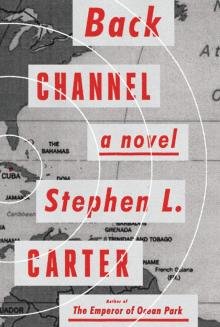 Back Channel
Back Channel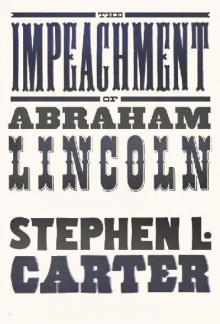 The Impeachment of Abraham Lincoln
The Impeachment of Abraham Lincoln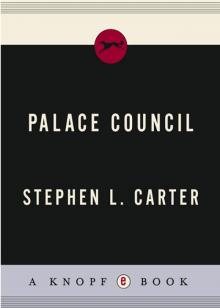 Palace Council
Palace Council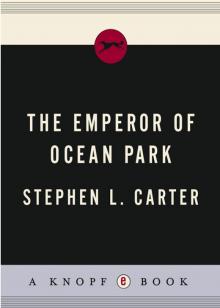 The Emperor of Ocean Park
The Emperor of Ocean Park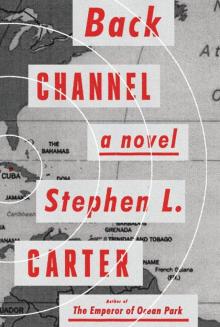 Back Channel: A novel
Back Channel: A novel Emperor of Ocean Park eh-1
Emperor of Ocean Park eh-1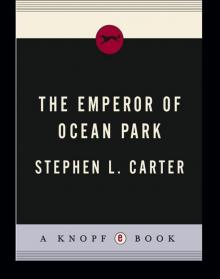 Emperor of Ocean Park
Emperor of Ocean Park